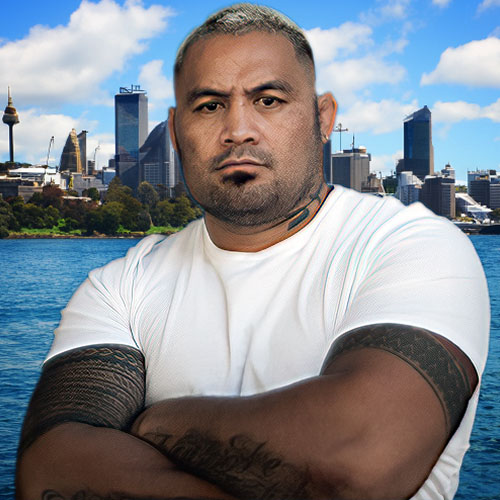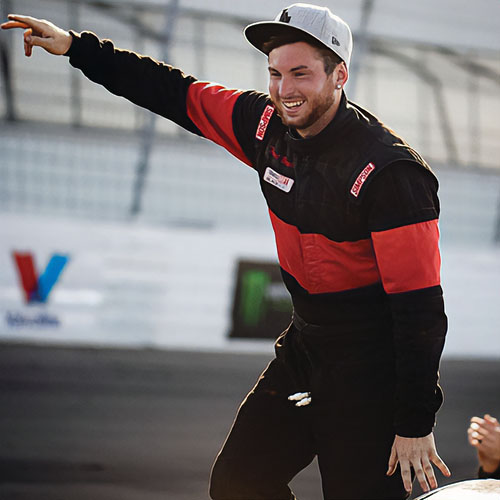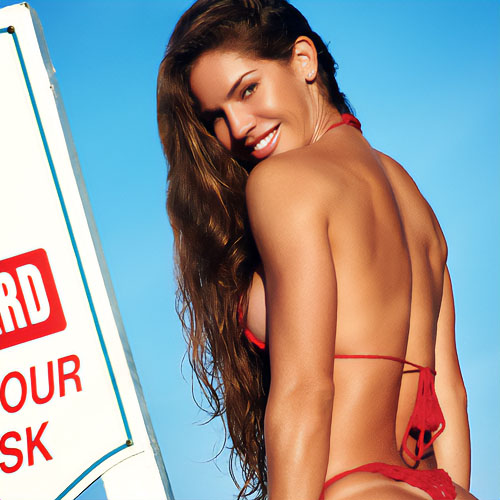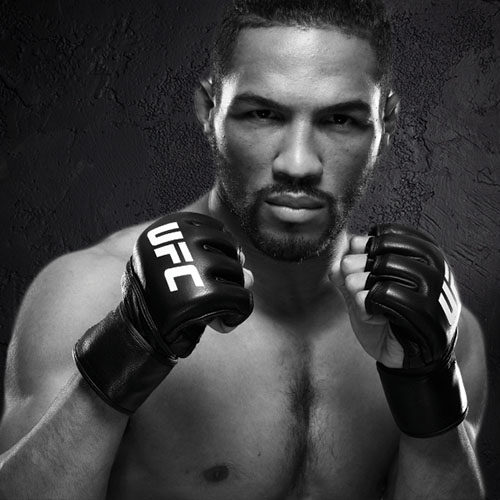In February, Georges St-Pierre announced his UFC retirement after an astonishing career. He’s been called the best fighter to ever enter the octagon. Penthouse spoke to the Canadian legend before he stepped away.
Georges St-Pierre is known as the G.O.A.T.
For those unfamiliar with this bit of sports parlance, it stands for the “Greatest of All Time.”
It’s a huge claim to make about a fighter, and St-Pierre (also called “GSP” or “Rush”) isn’t the kind of guy who would make it. There’s no Conor McGregor-esque showboating with GSP. He has no need to lord his incredible record over you: the 2,204 consecutive days defending his title; the plethora of fighting publications ranking him as the greatest welterweight fighter of all time; the rare ability to not only fight across divisions but to be the best. He’s earned the right to call himself a bad motherfucker, but during our interview, he was genial, polite, even friendly. Maybe it was because GSP, now 38, was older than most champs. Or maybe it was his Kyokushin karate training, a martial arts discipline that emphasizes humility and self-control. Or perhaps years of cage fighting in the UFC taught him that, when you get down to brass tacks, hubris gets you nowhere.
In November 2017, the Québec native returned to the octagon after a four-year hiatus, moving up a weight class and choking out Michael Bisping to claim the middleweight title. The fight, held at Madison Square Garden, was Canada’s most-watched pay-per-view event ever, and had UFC commentators saying it looked like GSP had only been gone four months, instead of years. His decision to leave fighting in 2013 was made partly because he needed a break, psychologically, from the sport he loved, and partly due to dissatisfaction with the ways the UFC was dealing with drug cheats. During his time off, St-Pierre indulged his other passion, paleontology. Yes, the guy famous for beating grown men to a bloody pulp in fight after championship fight is a huge dinosaur nerd.
It’s this multifaceted nature—his fierce combativeness in the ring, his geniality in person, his enduring dedication to such a physical sport, and his geeky love of paleontology—that made him so intriguing an elite figure in the UFC. Was St-Pierre the greatest fighter of all time? It’s a matter for debate. But without a doubt, GSP was one of the most interesting.
We sat down with St-Pierre to talk about what motivates him, what secrets he discovered that kept him on top for so long, why he retired for the first time in 2013, and which beautiful woman, attending one of his fights, briefly made him lose his focus.
What was behind your decision to walk away from the UFC in 2013?
I had a lot of personal issues. The pressure of always being in the spotlight and being criticized—it really got to my head to the point it was driving me a little bit crazy. I was developing anxiety and so, for my own health—for my mental health—I needed to leave. Also, I had problems with the UFC and their drug-testing policy. I knew a lot of people were cheating. It had been bothering me for a long time. I was carrying this with me for a long time, fighting and trying to perform and it was starting to affect my performance.
What inspired you to get back in the ring?
When I left, I never said I was retired, because I thought I wanted to come back if changes were made. Now, with the USADA [U.S. Anti-Doping Agency], the sport is cleaner. Also, I wanted to come back to do something special, to do something unique. Something that would be different from what I was doing in the past.
Fighting for the middleweight title interested me. I always received a lot of criticism from the fans. They said I didn’t finish fights, that I fought surgically, that I didn’t take enough risks and never went up a weight class. So, I wanted to shut up these three criticisms in one fight and that’s why I came back. I was very hungry for that fight. I came back and it was a good night for me.
You were only the fourth fighter in UFC history to be a multidivision champion. I get the idea you don’t like to be told you can’t do something.
If someone says you can’t do something, that’s when you need to do it. It’s a rare achievement, so that’s why I wanted to do it. I did it for myself. A lot of people do it for other people, but I wanted to do it for myself, for my own legacy, to be able to know that I did it.
Being a champ and having a belt—what does that mean to you?
The belt, the name…it’s more of a symbol. To be honest with you, the more experienced I became, I realized there is no strongest man in the world. This doesn’t exist. When you have a belt, most people, for them, it means, “Oh, I’m the most bad-ass man in the world.” It’s not true. Maybe the baddest man in the world is sitting on his couch eating popcorn, you know what I mean? You’d never know. The more experienced you are, you realize what it means. Winning a belt just means on that night, at that particular moment, you beat that guy. You were better than that guy. It doesn’t mean you’re better than all the other guys. Or it doesn’t mean that the guy you beat that day won’t beat you another day.
So a lot of things changed as I matured. When you’re young, you want to be known as the “baddest man,” and when you get older, you realize [they’re] just symbols. I wanted to do it for myself and to have the belt. It was a great achievement, but for me it doesn’t mean the same thing that it means for a lot of the people.
What do you say to those who argue MMA is too violent?
It’s very dangerous. When people say, “It’s a barbaric sport, I don’t like it, I don’t want to watch it,” they’re right that it’s a barbaric sport. Like boxing is a barbaric sport. Like American football is a barbaric sport. Rugby is a barbaric sport. But you know what, I love it. I did it and I grew up on it. It’s just a different form of entertainment and people have different tastes for different things.
I think everybody secretly loves it. I had a girlfriend that said she hated it, but every time the fight started she’d be glued to the screen.
Dana White once said something I thought was very clever. Say you’re at a football match or a rugby match, in the seats, watching the match, and a fight breaks out in the crowd. Everybody will stop watching the match and start watching the fight in the crowd.
Because it’s part of our nature. It’s part of who we are. I can put anybody in a situation where he will have to fight. It can be my mom, who is the nicest human being, but I can put her in a situation that she would have to fight to defend herself or defend the people that she loves. Everybody can relate to that, that’s why it is so popular.
You were talking about the psychological pressures of fighting. How do you deal with that aspect of the sport?
That’s a very important aspect to fighting, and it applies to every sphere of life—sport, business, when you ask a girl on a date. It could be anything. In my sport, there are skills and there is confidence. Some people have the skills, but they don’t have the confidence. It’s like having money in the bank without spending it.
Other athletes have the confidence but don’t have the skills. It’s like a dream that can never be achieved. That’s what my trainer, John Danaher, would say to me and it was very, very smart: “The key is to have the skills and the confidence.” That’s what makes a good athlete. You need both. For example, Michael Jordan. Michael Jordan started acting like a champion before he became a champion. LeBron James, same thing. Tiger Woods in golf, same thing. Every actor—Arnold Schwarzenegger—same thing. They have that kind of confidence. Confidence is sort of a mental game. Confidence is a choice you can work on.
I wasn’t always that confident before a fight, but I could work on it. I had tricks I used to make myself confident, so when I went into the fight, I could pretend that I was confident, even if I wasn’t. I became confident using these tricks. And confidence is very important for a fighter, important for a businessman, important for everything you do in life. Because when you do something, you need to have trust that when you do it, you can do it 100 percent, no reservations, and confidence is a big part of that.
Who do you view as the top fighters in those middle divisions?
MMA is a sport in constant evolution. Someone could be good today and in six months, there’s going to be another guy who’s going to come out of nowhere, do something incredible, and he will be the guy to beat. He will be hyped up as the best-ever, so we never know. Right now, I like Khabib [Nurmagomedov]. He’s incredible. He’s an amazing fighter. But I’ll also go back to something I said earlier. It’s not necessarily the best fighter who wins a fight. It’s the fighter who fights best the night of the fight.
You’ve been called “The Greatest of All Time” and you’ve spoken about your true loves and what excites you—women, dinosaurs, and fighting. So I’ve got three final questions. First, who’s the greatest woman of all time?
Greatest woman of all time? My God, that’s a hard question. I’ll mention one very beautiful woman, Cindy Crawford. I remember she came to one of my fights and I saw her in the crowd and lost focus for a second. I think she’s amazing.
Obviously, now we need to know the greatest dinosaur of all time.
For me, it’s the Tyrannosaurus. T. rexes had the best olfactory senses of all the dinosaurs. That means a blind T. rex could still find you. The T. rex didn’t need his eyes to hunt. That’s something people don’t know. The T. rex was an amazing creature.
Sounds terrifying. Last one: Who’s the greatest fighter of all time?
That’s hard to say. Like I said, it doesn’t exist. We can just pile up the achievements of the athlete. And the sport constantly evolves. The fighters of today are better than the fighters of yesterday, and it goes on like this. Someone can be good today, but in ten years there are going to be guys that are better. That’s what I believe—that records are meant to be broken.

















